Abdullah Bozkurt/Stockholm
The US Treasury’s decision to sanction a Turkish company for financing arms transactions to Yemen’s Houthi rebels on behalf of Iran’s Islamic Revolutionary Guard Corps (IRGC) Quds Force is not surprising. Numerous similar shell companies, established in Turkey by Iranian proxies, have been operating without consequences under the oversight of the government of Turkish President Recep Tayyip Erdogan.
Indeed, Al Aman Kargo İthalat İhracat ve Nakliyat Limited Şirketi, an export, import and transportation firm that was sanctioned by the US Department of the Treasury’s Office of Foreign Assets Control (OFAC) on December 28, 2023, was established just three months after the Erdogan government suppressed the country’s most extensive investigation into the Quds Force network in Turkey.
According to trade registry records, Al Aman was founded on May 5, 2014 by a Syrian national named M. Amin Balid, residing in Aleppo, with 2 million Turkish lira in capital. Its office was located in Istanbul’s conservative Fatih district. The incorporation bylaws indicate that its primary business focus was logistics and transportation services.
The company’s establishment took place after the Erdogan government killed a confidential terrorism investigation into the IRGC Quds Force in February 2014. The investigation, initiated in 2011, was halted when the government learned about it. The investigating prosecutor was dismissed before securing detention warrants for suspects or filing an indictment. The suspects avoided legal action due to Erdogan’s intervention, apparently safeguarding pro-Iranian assets and aiding their Quds Force handlers in escaping from Turkey.
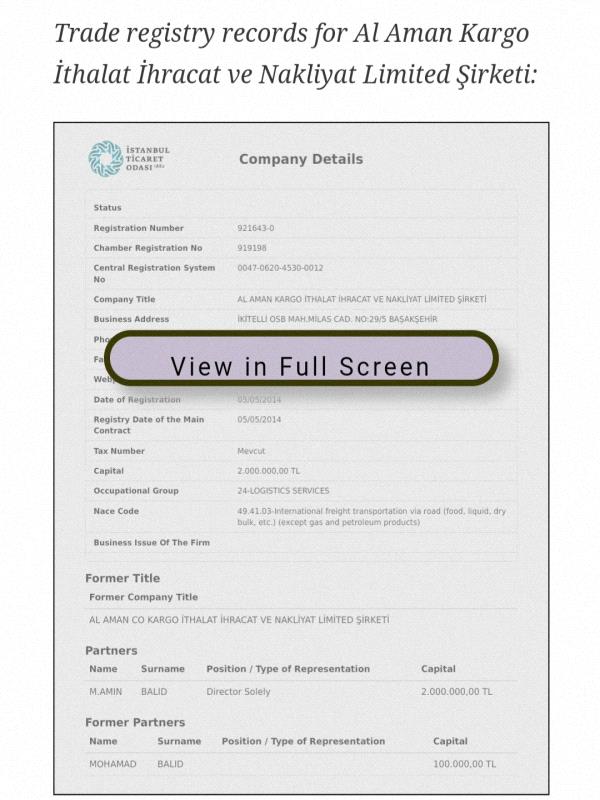
Irfan Fidan, personally appointed by Erdogan to dismantle the Quds Force probe, dismissed all charges against the Iranian and Turkish nationals implicated in the Quds Force cells. He initiated a new criminal case against those involved in the initial investigation, ordering the detention of police chiefs who had uncovered the intricate Iranian network in Turkey. Fidan’s efforts to stifle the probe were rewarded by the Erdogan government, and he was subsequently appointed as a member of the Constitutional Court in 2020.
Some of the suspects investigated in the Quds Force case and saved by Erdoğan were designated under sanctions by the US Treasury in May 2022. According to OFAC, Turkish nationals Hakkı Sel�uk Şanlı, Abdulhamit �elik and Seyyid Cemal G�nd�z worked with IRGC official Behnam Shahriyari (aka Sayed Ali Akber Mir Vakili) in an international oil smuggling and money laundering network that generated hundreds of millions of dollars for Iran and its proxy, Hezbollah, in Lebanon.
Empowered by the protection of the Erdogan government, the Quds Force expanded its operations in Turkey and began more assertively utilizing Turkish territory to conduct activities in the region. Al Aman was established within this permissive environment.
According to the US Treasury’s findings, the company was identified as part of a network operated by Sa’id al-Jamal, a Quds Force affiliate. It played a crucial role in facilitating the transfer of millions of dollars to the Houthis, a pro-Iran group. In recent months, the Houthis have initiated attacks on commercial vessels in the vicinity of Yemen’s coastline, disrupting the free flow of international shipping in the Red Sea and the Gulf of Aden.
meExtremismMilitaryTerrorism and CrimeIntelligenceForeign PolicyContact UsAbout Us
Iran utilizes Turkey as a support hub for Yemeni proxy the Houthi rebels
January 11, 2024
A A
Iran utilizes Turkey as a support hub for Yemeni proxy the Houthi rebels
Abdullah Bozkurt/Stockholm
The US Treasury’s decision to sanction a Turkish company for financing arms transactions to Yemen’s Houthi rebels on behalf of Iran’s Islamic Revolutionary Guard Corps (IRGC) Quds Force is not surprising. Numerous similar shell companies, established in Turkey by Iranian proxies, have been operating without consequences under the oversight of the government of Turkish President Recep Tayyip Erdogan.
Indeed, Al Aman Kargo İthalat İhracat ve Nakliyat Limited Şirketi, an export, import and transportation firm that was sanctioned by the US Department of the Treasury’s Office of Foreign Assets Control (OFAC) on December 28, 2023, was established just three months after the Erdogan government suppressed the country’s most extensive investigation into the Quds Force network in Turkey.
According to trade registry records, Al Aman was founded on May 5, 2014 by a Syrian national named M. Amin Balid, residing in Aleppo, with 2 million Turkish lira in capital. Its office was located in Istanbul’s conservative Fatih district. The incorporation bylaws indicate that its primary business focus was logistics and transportation services.
The company’s establishment took place after the Erdogan government killed a confidential terrorism investigation into the IRGC Quds Force in February 2014. The investigation, initiated in 2011, was halted when the government learned about it. The investigating prosecutor was dismissed before securing detention warrants for suspects or filing an indictment. The suspects avoided legal action due to Erdogan’s intervention, apparently safeguarding pro-Iranian assets and aiding their Quds Force handlers in escaping from Turkey.
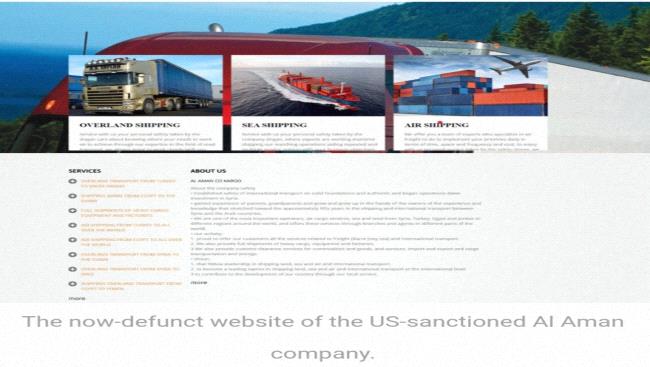
“Today’s action underscores our resolve to restrict the illicit flow of funds to the Houthis, who continue to conduct dangerous attacks on international shipping and risk further destabilizing the region,” said Under Secretary of the Treasury for Terrorism and Financial Intelligence Brian E. Nelson as he announced the sanction designation. “The United States, along with our allies and partners, will continue to target the key facilitation networks that enable the destabilizing activities of the Houthis and their backers in Iran.”
According to US intelligence, the Quds Force has deposited millions of dollars with Al Aman for subsequent shipment to Yemen. In Yemen, these funds are ultimately channeled into the accounts of the Nabco Money Exchange and Remittance Co. (Nabco), a successor company to the US-designated Al-Hadha Exchange Co. The Turkish firm has also collaborated with the US-designated Yemeni exchange house Al Alamiyah Express Company for Exchange and Remittance, facilitating the transfer of funds from Turkey on behalf of the Houthis and the Sa’id al-Jamal network.
Despite designating Al Aman for sanctions, the United States opted not to include its sole owner, M. Amin Balid, in the sanctions designation
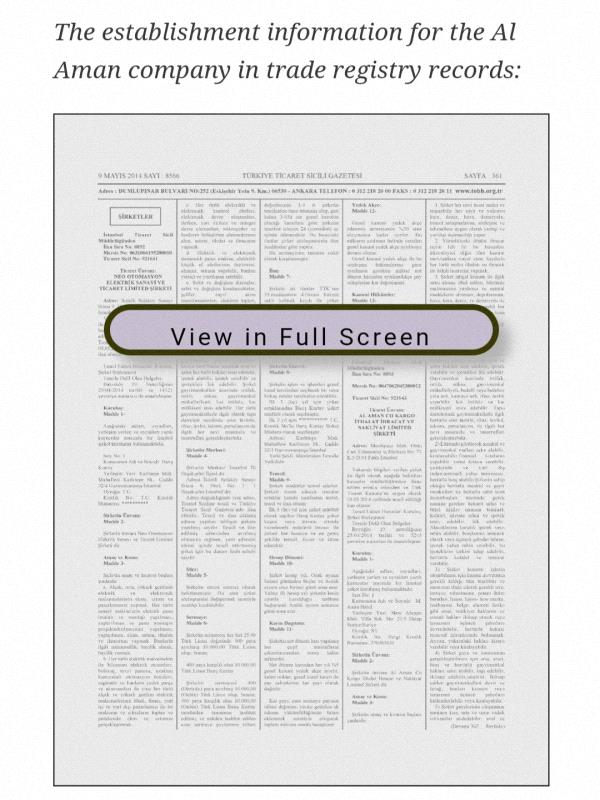
There is limited information available about Balid, who asserts on his LinkedIn profile that he has been overseeing the company for over 31 years, despite its establishment in 2014 under tax ID number 370381635. Trade filings reveal that he has frequently changed the company’s officially registered address, suggesting that it functions as a shell company.
In September 2014 M. Amin Balid introduced a Turkish national named Celal Oktay as a minority shareholder in the company, but Oktay’s name was removed from the records in February 2015. Similarly, in September 2019, M. Amin Balid transferred some shares to a man named Mohamed Balid, who is registered as a Syrian refugee under temporary protection in Turkey. However, M. Amin Balid reclaimed those shares in November 2021. These share transfers and changes in ownership suggest a dynamic and potentially intricate structure for the company.
The company’s now-defunct website, accessed through the Wayback Internet Archive site, presented the firm as a logistics solution provider offering land, sea and air transportation services. It seems to have predominantly engaged in overland transportation, catering to destinations in the Middle East, particularly Yemen.
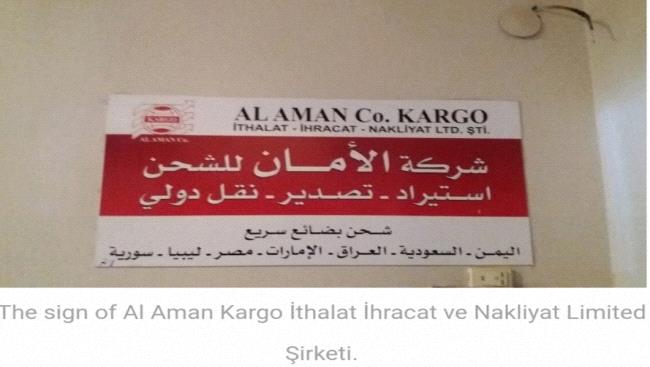
The utilization of Turkey-registered companies has been a modus operandi employed by the Quds Force to conceal Iranian intelligence’s covert operations and take advantage of the Turkish banking and financial system. Additionally, Turkish firms, unlike their Iranian counterparts, tend to attract less suspicion in international transactions. This strategy allows the Quds Force to operate with a greater degree of discretion and evade detection in their financial activities.
According to data released in December 2023 by the Turkish Union of Chambers and Commodity Exchanges (TOBB), the largest business group in the nation, Iranians established 43 new companies in November 2023. Predominantly structured as limited companies, these ventures have propelled Iranians to the forefront of the list of foreign investors creating new enterprises in the Turkish market.
The relatively modest scale of trade between Turkey and Iran presents a stark contrast to the proliferation of Iranian-owned businesses in Turkey. Many of these companies, established by proxies of the mullah regime in Turkey, utilize third countries as intermediaries to export sanctioned and dual-use products, effectively obscuring their transactions. This complex network allows them to navigate sanctions and conduct business with a degree of opacity.
It remains unclear how many firms Iranian intelligence utilizes among those owned by non-Iranians such as M. Amin Balid in Turkey. However, information available from the OFAC sanction list and the 2014 investigation into the Quds Force indicates that the IRGC employs multiple nationalities to hide its tracks.
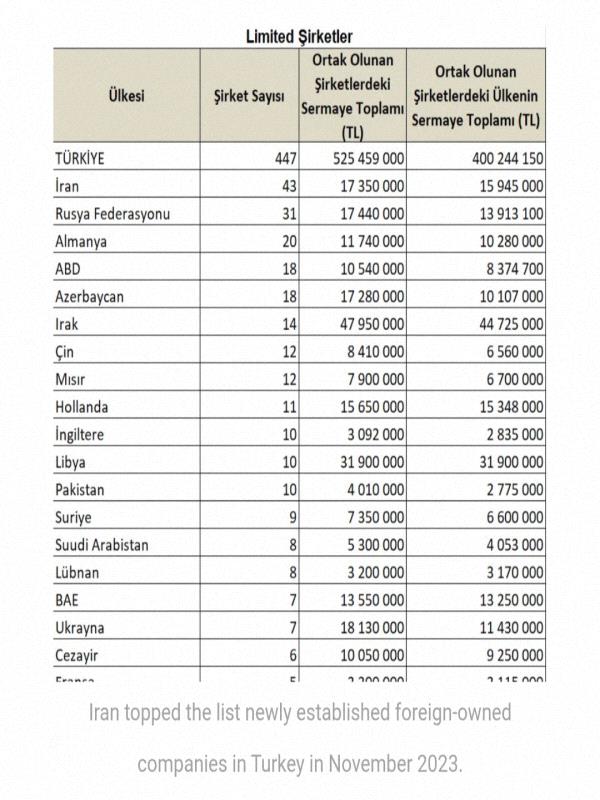
In March 2022 Nordic Monitor published a report that a series of cruise missile attacks on targets in Yemen and Saudi Arabia, using missiles manufactured in Iran, was facilitated by parts procured in Turkey. UN investigators uncovered this information while probing the chain of custody of various components recovered from the debris of the missiles employed in the attacks on Saudi Arabia and those seized in the Gulf of Aden.
The evidence led to the discovery that a key component used in the manufacturing of the missiles was imported from Germany by a Turkish company in 2016. The component, identified as a 30.600 G OEM Pressure Transmitter, was originally produced by German company BD Sensors and was used in the fuel-feed system of the missile. According to UN documents, the German company shipped the transmitter to the Istanbul-based Lonca Makina Sanayi Ticaret A.Ş., its only authorized distributer in Turkey.
The discovery is hardly surprising to observers of Turkey-Iran cooperation in sanctions busting techniques. Faced with US sanctions, Iran has extensively been using neighboring Turkey to procure critical components, especially for dual-use goods, to support its defense industry and produce arms and weapons, some of which it has exported to fuel regional conflicts in the Middle East and Africa.
Tehran has been significantly helped by President Erdoğan, who considers Iran his second home and actively works to facilitate Iran’s operations in Turkey and other countries.
Erdogan and his associates have enriched themselves through clandestine operations over the past decade, allowing Iranians to conduct money laundering, fictitious trade and terrorist financing operations in exchange for bribes. In the corruption probes of December 2013, it was revealed that Erdogan and several of his ministers accepted bribes from Iranian gold trader Reza Zarrab, who facilitated the movement of Iranian funds through Turkish state lender HalkBank